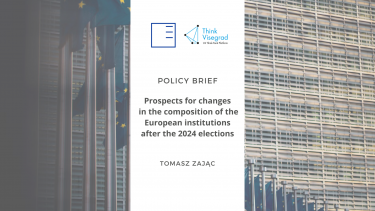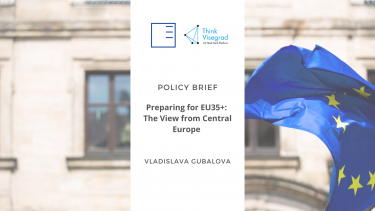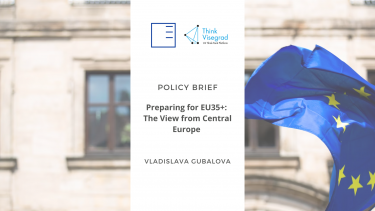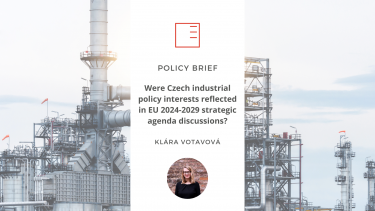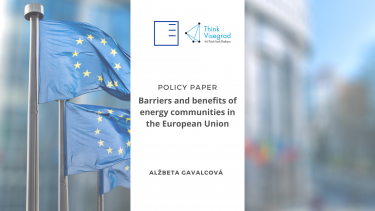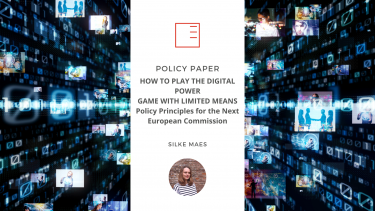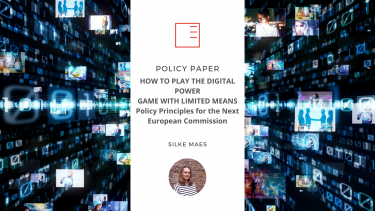Policy Brief | Prospects for changes in the composition of the European institutions after the 2024 elections
This policy brief analyses the prospective changes in the European Parliament (EP) composition following the 2024 elections. It reflects on the evolving political environment since 2019, highlighting shifts in party dynamics within the EP, such as the fragmentation of traditional party dominance and the emergence of new political alignments. Additionally, it explores potential reconfigurations in top EU positions post-elections and examines ongoing concerns regarding geographical representation within EU institutions, particularly the European Commission. Writes Tomasz Zając from the Polish Institute of International Affairs (PISM).
Zjistit vícePolicy Brief | Vyhlídky na změny ve složení evropských institucí po volbách v roce 2024
Publikace analyzuje možné změny ve složení Evropského parlamentu po volbách v roce 2024, zamýšlí se nad vývojem politického prostředí od roku 2019 a poukazuje na posuny ve stranické dynamice, jako je roztříštění tradiční stranické dominance a vznik nových politických uskupení. Kromě toho zkoumá možné změny v obsazení vrcholných pozic v EU po volbách a zabývá se přetrvávajícími obavami ohledně geografického zastoupení v institucích EU, zejména v Evropské komisi. Píše Tomasz Zając z Polského institutu mezinárodních vztahů (PISM).
Zjistit vícePolicy Brief | Preparing for EU35+: The View from Central Europe
Despite the historical support of EU enlargement policy by the Visegrad Four (V4), these Central European states are now faced with the challenge of reconciling their stances with the new realities of the process. As Ukraine and Moldova opened their accession negotiations, the EU seems to be torn on the questions associated with the future enlargement(s) - institutional reforms and changes within the EU budget. Transitioning from economic beneficiaries to potential contributors, the V4 states must evaluate the potential political and economic impacts of new members on both the EU and their domestic levels. Writes and proposes recommendations Vladislava Gubalova from GLOBSEC.
Zjistit vícePolicy Brief | Příprava na EU35+: Pohled ze střední Evropy
Navzdory historické podpoře politiky rozšiřování EU ze strany zemí Visegrádské čtyřky stojí tyto středoevropské státy před výzvou, jak sladit své postoje s novou realitou tohoto procesu. Vzhledem k tomu, že Ukrajina a Moldavsko zahájily přístupová jednání, je EU rozpolcena v otázkách spojených s budoucím rozšířením - institucionálními reformami a změnami v rámci rozpočtu EU. Při přechodu od ekonomických příjemců k potenciálním přispěvatelům musí státy V4 vyhodnotit potenciální politické a ekonomické dopady nových členů jak na EU, tak na své domácí úrovni. Píše Vladislava Gubalová z GLOBSEC.
Zjistit vícePolicy Brief | Were Czech industrial policy interests reflected in EU 2024-2029 strategic agenda discussions?
In light of the recent return of industrial policy to the global and EU stage, this policy brief outlines how Czech interests in this policy were reflected in the debates leading up to the adoption of 2024-2029 EU strategic agenda. First, it strives to define Czech industrial policy interests, outlining two alternative approaches to how they can be perceived. The liberal approach follows the long established consensus, according to which Czechia – as a very open, export oriented economy – should promote above all a seamless Single Market and free trade. Writes EUROPEUM Institute researcher Klára Votavová in her Policy Brief.
Zjistit vícePolicy Brief | Byly zájmy české průmyslové politiky zahrnuty v diskusích o strategické agendě EU na roky 2024-2029?
V souvislosti s nedávným návratem průmyslové politiky na globální a unijní scénu tento policy brief popisuje, jak se české zájmy v této politice odrážely v debatách vedoucích k přijetí strategické agendy EU na období 2024-2029. Nejprve se snaží definovat zájmy české průmyslové politiky a nastiňuje dva alternativní přístupy k tomu, jak je lze vnímat. Liberální přístup navazuje na dlouhodobě zavedený konsenzus, podle něhož by Česko - jako velmi otevřená, exportně orientovaná ekonomika - mělo prosazovat především bezproblémový vnitřní trh bez překážek a volný obchod. Píše výzkumná pracovnice Institutu EUROPEUM Klára Votavová ve své nové publikaci.
Zjistit vícePolicy Paper | Barriers and benefits of energy communities in the European Union
Energy communities are an effective means to decentralize and renew our energy systems with sustainable solutions as they are usually based on renewable energy. They have already started emerging in 1970´s, yet there has been a significant increase in their development only in recent years, also in terms of their introduction into the EU legislation. Especially in Western and Northern European countries the concept already enjoys vast popularity. On the other hand, in Central and Eastern European countries (further referred to as CEE) energy communities are only beginning to emerge. The policy brief (based on literature and interviews with various stakeholders ) examines the benefits energy communities may bring, and more importantly, the main obstacles remaining in their way for greater evolution in the CEE region – and especially Visegrad countries (V4). As these initiatives progress, sharing the best practices will ensure the success of the community energy in the energy transition. Writes Alžbeta Gavalcová.
Zjistit vícePolicy Paper | Barriers and benefits of energy communities in the European Union
Energetické komunity jsou účinným prostředkem decentralizace a obnovy našich energetických systémů pomocí udržitelných řešení, protože jsou obvykle založeny na obnovitelné energii. Začaly se objevovat již v 70. letech 20. století, avšak k jejich výraznému rozvoji došlo až v posledních letech, a to i z hlediska jejich zavedení do legislativy EU. Zejména v zemích západní a severní Evropy se tato koncepce již těší velké oblibě. Naproti tomu v zemích střední a východní Evropy (dále jen SVE) se energetická společenství teprve začínají vytvářet. Tento politický brief (založený na literatuře a rozhovorech s různými zúčastněnými stranami ) zkoumá výhody, které mohou energetická společenství přinést, a především hlavní překážky, které jim stále stojí v cestě k většímu rozvoji v regionu střední a východní Evropy - a zejména v zemích Visegrádské skupiny (V4). Jak tyto iniciativy postupují, sdílení osvědčených postupů zajistí úspěch komunitní energetiky v energetickém přechodu. Píše Alžbeta Gavalcová.
Zjistit vícePolicy Paper | HOW TO PLAY THE DIGITAL POWER GAME WITH LIMITED MEANS Policy Principles for the Next European Commission
In the global competition for technological dominance, this policy brief sets out six principles for the next Commission on how to play the digital power game with limited resources. Despite the size of its market, the EU lacks common fiscal capacity, capital markets and labour market dynamics. Writes Silke Maes, Research Fellow at EUROPEUM Institute.
Zjistit vícePolicy Paper | HOW TO PLAY THE DIGITAL POWER GAME WITH LIMITED MEANS Policy Principles for the Next European Commission
Svět se nachází v horké fázi globální soutěže o nadvládu v nových technologiích. Pokud chce EU zůstat do budoucna konkurenceschopná, musí být více aktivní. Jak na to rozebírá náš nejnovější policy paper z pera výzkumné pracovnice Silke Maes. Navrhuje v něm šest konkrétních kroků pro novou Evropskou komisi vzešlou z voleb do EP v roce 2024.
Zjistit víceStaroměstské náměstí 4/1
Praha 1 - Staré Město
110 00
tel.: +420 212 246 552
email: europeum@europeum.org
https://www.europeum.org
